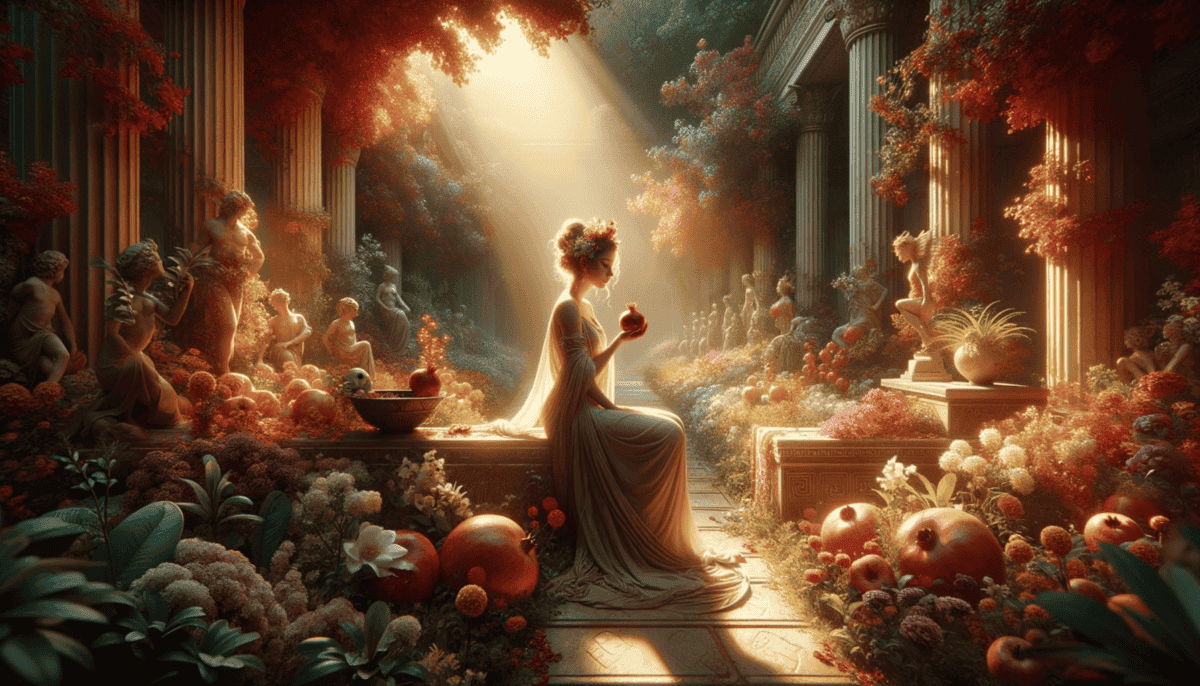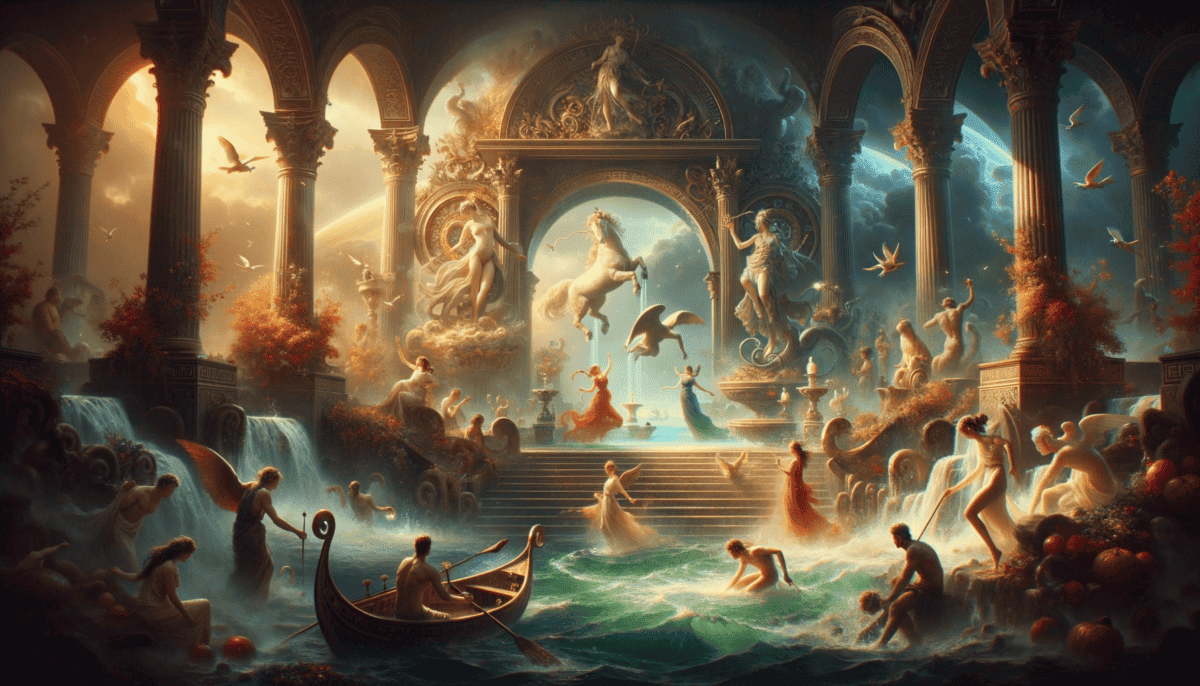The Eye That Curses
Long ago, in a village nestled among the olive groves of ancient Greece, lived a girl named Thea. She had eyes that sparkled like the stars in the night sky.
"Mama, why do people keep giving me blue beads?" Thea asked one morning, holding up a string of bright azure charms.
Her mother smiled warmly. "Those are special beads, my dear. They protect you from the evil eye."
It’s when someone looks at you with jealousy or bad feelings. The ancient Greeks believed this look could bring bad luck!
Thea twirled the beads in her fingers. "But why would anyone want to give me bad luck?"
Her mother sat beside her on their stone doorstep. "Sometimes, when people see something beautiful or special, they might feel jealous without meaning to. That's how the story of the first evil eye began."
"Tell me the story, Mama!" Thea bounced excitedly.
"Well, it all started with a young woman named Kallista, whose beauty caught the eye of Zeus himself…"
The First Curse
Kallista danced in the meadows every morning. Her movements were so graceful that even the flowers turned to watch her. Zeus, the king of gods, couldn't take his eyes off her.
But Hera, Zeus's wife, grew angry and jealous. Her divine gaze filled with such powerful envy that it created the first evil eye curse.
"What happened to Kallista?" Thea whispered, clutching her blue beads.
"The curse made her trip while dancing. She fell and hurt her ankle. From that day on, people learned to protect themselves from jealous looks."
The Protection Ritual
"That's why we have these special ways to stay safe," Thea's mother explained, touching the blue eye charm hanging by their door. She taught Thea the ancient protection words:
“Ftou, ftou, ftou!
Away with the evil eye,
Let good luck stay nearby!”
Thea practiced the words, giggling as she pretended to spit three times (just like the grown-ups did). Her mother showed her more ways to stay safe:
• Wear blue beads
• Hang protective charms
• Keep salt in your pockets
• Never brag about good fortune
• Thank the gods for your blessings
The Village Wisdom
As Thea grew older, she noticed how the whole village worked together to keep the evil eye away. Old Dimitri, the fisherman, painted eyes on his boats. Maria, the baker, hung garlic braids above her oven. Even baby Andreas wore a tiny blue pin on his blanket.
"The evil eye doesn't care if you're rich or poor," the village elder would say. "It can find anyone who forgets to be humble."
One day, while helping her mother in their garden, Thea saw a neighbor admiring their tomato plants. The woman's gaze lingered a bit too long on their rich, red fruit.
That evening, three tomato plants wilted mysteriously.
"Quick!" her mother said. "Get the blue water!"
They sprinkled special blessed water around the garden, saying the protection words. By morning, the plants stood tall again.
Lessons from the Past
"You see," Thea's mother said, "the evil eye is as old as jealousy itself. Even the gods weren't immune to it. That's why we must always remember to…"
"Be humble and grateful!" Thea finished, proudly wearing her blue bead necklace.
As the sun set behind Mount Olympus, casting long shadows across their village, Thea understood why these ancient beliefs still mattered. The evil eye wasn't just an old story – it was a reminder to stay kind, humble, and protective of others.
That night, before sleeping, Thea carefully placed her blue beads under her pillow. She could almost hear the ancient whispers of her ancestors, sharing their wisdom through time, keeping her safe with their time-tested traditions.
Hermes’ Messenger Coins
The morning sun glinted off something shiny in the fountain. Little Thea leaned over the edge, her blue protective beads swinging from her neck.
“Look, Mama! Someone threw coins in the water!” she exclaimed.
Her mother smiled knowingly. “Ah yes, those are messages for Hermes. Would you like to hear why we toss coins into water?”
He was the messenger of the gods! He carried messages between the world of gods and humans. He also helped souls cross into the afterlife.
The Sacred Waters
“Long ago,” her mother began, “when someone died, their family would place a coin under their tongue. This coin was for Charon, the ferryman who carried souls across the River Styx.”
“What happened if they didn’t have a coin?” Thea asked, her eyes wide.
“Then the poor soul would have to wait by the river for a hundred years! That’s why people started tossing coins into fountains and wells – to make sure Hermes would always have messages and coins to help lost souls.” ⚡
The Lucky Splash
Thea pulled a small copper coin from her pocket. “Can I make a wish?”
“Of course! But remember, you must:
• Hold the coin in your right hand
• Close your eyes tight
• Throw it over your left shoulder
• Keep your wish a secret!
Thea followed the instructions carefully. The coin made a tiny splash as it joined the others at the bottom of the fountain.
Messages to the Gods
“But how does Hermes get the coins?” Thea wondered aloud.
Her mother pointed to the water’s surface, where ripples danced in the sunlight. “See how the water moves? That’s Hermes’ magic at work. He can travel faster than the wind itself!”
Just then, a gentle breeze rustled through the olive trees. Thea imagined she saw a fleeting shadow – perhaps Hermes himself, collecting messages for Mount Olympus? �風
The Coin Keeper’s Tale
Old Sofia, who tended the village fountain, had her own story to share.
“Once,” she told Thea, “a poor woman threw her last coin into these waters, asking Hermes to help her sick child. The next morning, she found a healing herb growing right beside her door!”
Sofia lowered her voice to a whisper. “And every full moon, if you listen carefully, you can hear the coins singing – that’s Hermes counting his messages.”
Modern Day Messengers
As more villagers came to the fountain, each with their own coin and wish, Thea noticed something interesting. Some tossed coins for luck, others for love, and some simply to say “thank you.”
“Every coin is a different kind of message,” her mother explained. “Just like Hermes carried all sorts of messages for the gods, our coins carry our hopes and dreams.”
That evening, as the sun painted the fountain waters golden, Thea helped Sofia clean around the fountain’s edge. They were careful not to disturb the coins – each one representing someone’s special message to the gods.
“Remember,” Sofia said with a wink, “Hermes is always listening. That’s why we keep the tradition alive, passing it down like precious coins from one generation to the next.” ✨
Thea touched her blue protective beads and smiled at her coin, glinting beneath the water’s surface. She knew her wish was in good hands – speeding its way to Mount Olympus on Hermes’ swift wings.
Poseidon’s Maritime Mysteries
The salty breeze ruffled Captain Andreas’s gray beard as he stood at the helm of his fishing boat. His young grandson, Nikos, watched him check the sky with worried eyes.
“Why do you look so scared, Pappoú?” Nikos asked.
“The sea is restless today, little one. Poseidon must be in one of his moods,” the old captain replied.
He was the mighty god of the sea! He ruled all the waters and could make big waves with his special trident.
The Sea God’s Rules
“When I was your age,” Captain Andreas began, “my father taught me the old ways of respecting the sea. Would you like to learn them?”
Nikos nodded eagerly, his eyes bright with curiosity.
“First, never whistle on a boat – it challenges the wind spirits. And never rename a ship without asking Poseidon’s blessing first!”
The Naming Ceremony
A small crowd gathered at the dock where a freshly painted boat bobbed in the water. Old Maria, the village elder, stepped forward with a bottle of wine.
“Great Poseidon, we ask your blessing for this vessel. May you grant her safe passage across your waters.”
The bottle broke against the bow, christening the boat “Sofia’s Dream.” The crowd cheered, but Captain Andreas made sure to toss a gold coin into the waves – a gift for Poseidon.
The Mysterious Depths
“Tell me about the sea spirits, Pappoú!” Nikos begged.
The old captain’s eyes twinkled. “They say that on calm nights, you can hear the Nereids singing. They’re Poseidon’s helpers – fifty beautiful sea nymphs who watch over good sailors.”
The water around their boat sparkled as if tiny diamonds were dancing beneath the surface. ✨
Signs and Symbols
Captain Andreas showed Nikos the sacred items every boat must carry:
• A small jar of blessed seawater
• A silver coin tied to the mast
• A sprig of dried basil for good luck
The Storm’s Lesson
Dark clouds gathered overhead. The sea began to churn.
“Quick, Nikos! Help me turn the boat around,” Captain Andreas called.
As they headed back to port, dolphins appeared alongside their boat, leaping through the waves.
“See that?” the captain smiled. “Poseidon sent his friends to guide us home safely. That’s why we always treat dolphins with respect – they’re the sea god’s special messengers.”
The Harbor’s Welcome
Back at the harbor, other sailors shared their own stories of Poseidon’s power. One told of massive waves that parted around his boat during a storm. Another spoke of mysterious lights that led him away from dangerous rocks.
“The sea holds many secrets,” Captain Andreas explained to Nikos. “That’s why we must always show proper respect. Poseidon may be quick to anger, but he also protects those who honor the old ways.”
As the sun set, turning the waves to liquid gold, Nikos helped his grandfather secure the boat. He carefully placed a small offering – three fresh figs – at the edge of the dock.
“For Poseidon?” he asked.
“Yes, little one. For Poseidon, who watches over all who sail his waters.”
That night, as Nikos drifted off to sleep, he thought he heard distant singing carried on the wind – perhaps the Nereids, dancing in Poseidon’s underwater palace, keeping their eternal watch over the seas.
Spiders and Divine Transformation
Little Maria sat in her grandmother’s garden, watching a spider weave its web between two olive branches. The morning sun made the silk threads sparkle like strings of tiny diamonds. ✨
“Yiayia, why do we never break spider webs?” Maria asked her grandmother.
Yiayia settled into her favorite chair, her knitting needles clicking softly. “Ah, my sweet one. That’s the story of Arachne. Would you like to hear it?”
Every spider web tells a story of an ancient weaver who dared to challenge a goddess!
The Talented Weaver
“Long ago,” Yiayia began, “there lived a girl named Arachne. Her fingers could create the most beautiful tapestries anyone had ever seen!
“People came from far away to watch her work. They said her talent was a gift from the gods.”
“Was it?” Maria asked, leaning closer.
Yiayia shook her head. “Arachne didn’t think so. She said she was better than even Athena, the goddess of wisdom and weaving!”
The Divine Challenge
An old woman appeared at Arachne’s door one day. “Are you sure you want to say you’re better than a goddess?” she asked.
“I’ll prove it! I challenge Athena herself to a weaving contest!”
The old woman transformed into the mighty Athena! Her gray eyes flashed like storm clouds. ⚡
The Great Contest
Side by side they worked, goddess and mortal. Athena wove scenes of divine power and wisdom. But Arachne? She created pictures that showed the gods making mistakes.
“Her work was perfect,” Yiayia said softly. “But she forgot something very important.”
“What?” Maria whispered.
The Transformation
Athena looked at Arachne’s beautiful but disrespectful tapestry. Her face grew sad.
With a touch of her hand, Athena transformed Arachne into the first spider. ️
The Spider’s Lesson
Maria watched the garden spider continue its delicate work. “Is that why we don’t hurt spiders? Because they used to be people?”
“Partly,” Yiayia smiled. “But also because every spider reminds us to be humble. To respect the gods and their gifts.”
The spider in the garden finished one perfect spiral. Its web caught the sunlight like a string of stars.
The Modern Message
“Look closely,” Yiayia pointed. “Every spider still weaves beautiful things. Athena’s punishment was also a gift – a chance to create forever.”
Maria noticed more webs in the garden now. Each one was different, special in its own way.
“Can I learn to weave too?” she asked.
Yiayia pulled out a small loom. “Of course, little one. But remember Arachne’s story – talent is a gift to share, not to boast about.”
Nature’s Artists
As Maria learned her first stitches, spiders worked all around them. Their webs caught morning dew like tiny pearls. Birds sang in the olive trees. The garden was peaceful.
“The spiders are still making beautiful art,” Maria said. “Just like Arachne.”
“Yes,” Yiayia agreed. “And they teach us something new every day. That’s why Greek grandmothers say finding a spider web in your home brings good luck.”
The garden spider paused in its work, as if listening. Then it began another perfect spiral, writing its ancient story in silk, one thread at a time.
Persephone’s Seasonal Magic
Maria and Yiayia sat beneath their pomegranate tree, its branches heavy with ripe, red fruit. The autumn air was crisp, and fallen leaves danced around their feet.
“Why do the seasons change, Yiayia?” Maria asked, picking up a bright red leaf.
The changing seasons tell the story of a mother’s love and a daughter’s journey between two worlds!
The Daughter of Spring
“Let me tell you about beautiful Persephone,” Yiayia began, reaching for a pomegranate. “She was the daughter of Demeter, the goddess who made plants grow.”
“Was she happy?” Maria asked.
“Oh yes! She danced in meadows full of flowers. Her mother kept her safe and warm. Spring lasted forever then.”
The Lord of the Underworld
Yiayia’s voice grew softer. “But Hades, who ruled the dark underworld, saw Persephone dancing. He fell in love with her light and joy.”
“One day, while Persephone picked flowers, the ground split open. Hades appeared in his chariot and took her to his kingdom below.”
A Mother’s Grief
“Demeter was so sad!” Yiayia continued. “She stopped making things grow. The world turned cold and gray.” ❄️
“Like winter?” Maria asked, pulling her sweater closer.
“Exactly like winter. Nothing would bloom. People began to hunger.”
The Pomegranate Promise
“Why seeds?” Maria asked, looking at the fruit in Yiayia’s hands.
“Because eating food from the underworld meant she had to return. Persephone ate six seeds.”
The Cycle Begins
Yiayia split open the pomegranate, revealing the jewel-like seeds inside. “Now Persephone spends six months with Hades and six with her mother.”
“When she’s with her mother, Demeter is happy. Everything grows and blooms. That’s spring and summer!”
“But when Persephone returns to Hades…”
“Demeter becomes sad again,” Maria finished. “That’s fall and winter!”
The Magic of Change
“Yes! That’s why we have seasons,” Yiayia smiled. “And why pomegranates are special fruit. They remind us that change is part of life.”
Maria counted the seeds in her palm. “Like how school starts in fall and ends in spring?”
“Exactly! Everything has its season. Just like Persephone’s journey.”
Modern Day Magic
“Some people still keep pomegranates in their homes for good luck,” Yiayia explained. “They say it brings prosperity and helps gardens grow.”
Maria looked at their tree with new eyes. “Our tree tells Persephone’s story!”
“It does! And when winter comes, we’ll know spring will follow. Just like it always has, since Persephone’s time.”
Nature’s Promise
A cool breeze rustled the pomegranate leaves. More red and gold leaves swirled around them. Maria imagined Persephone preparing for her journey below.
“Will you tell me more stories about the gods?” she asked.
Yiayia smiled, gathering more fallen leaves. “Of course! Their stories are in everything around us – in the changing seasons, in every plant and star.”
Together they watched the sunset paint the sky in Persephone’s colors – gold like wheat, red like pomegranate seeds, and purple like the shadows of the underworld.
The Eternal Echo of Myths
Maria sat in her garden, watching butterflies dance among the flowers. A year had passed since Yiayia first began sharing the old stories. Now she saw magic everywhere.
Morning Reflections
“Look, Yiayia!” Maria pointed to a spider weaving its web in the morning sun. “Like Arachne’s tapestry!”
Yiayia smiled. “You remember well. The old stories live in everything we do.”
Signs and Symbols
Maria counted her discoveries on her fingers: “I saw Mrs. Kostas wear her evil eye bracelet at the market. And Captain Andreas still won’t whistle on his fishing boat!”
“The gods may sleep, little one, but their wisdom stays awake in our hearts.”
Modern Day Magic
Together they walked through their neighborhood. Maria spotted more signs of the ancient world:
• Blue eyes painted on house walls
• Pomegranates on doorsteps
• Spiders left undisturbed in corners
• Sea shells hung by windows
Wisdom of the Ages
“Why do we keep these old beliefs, Yiayia?” Maria asked, touching a shell wind chime.
“They connect us to something bigger,” Yiayia explained. “Like stars in the night sky.” ⭐
Stories That Travel
A plane flew overhead. Maria watched it disappear into clouds.
“The stories travel too,” Yiayia said. “In America, people knock on wood for luck – just like ancient Greeks knocked on temple doors!”
Nature’s Reminders
They reached the beach where waves rolled in and out. “Even the sea remembers Poseidon,” Yiayia smiled.
“And spring always comes back, like Persephone,” Maria added.
The Thread of Time
“The old stories help us understand big things,” Yiayia explained. “Like love, hope, and why the world works as it does.”
“They make the world more magical,” Maria said.
“Yes! And they remind us to be wise and kind.”
Tomorrow’s Tales
As the sun set, Maria and Yiayia headed home. A shooting star streaked across the sky. ✨
“Look!” Maria gasped. “Is that Zeus throwing lightning?”
Yiayia laughed. “Maybe! Or maybe it’s a new story waiting to be told.”
The Story Continues
That night, Maria dreamed of ancient temples and modern cities, of gods and mortals, of stories old and new. She understood now – the magic hadn’t gone away. It had simply changed shape, like Arachne into her spider form.
The next morning, she found a perfect spider web sparkling with dew outside her window. Below it, a blue eye charm hung next to a pomegranate tree, while waves whispered ancient secrets in the distance.
Maria smiled. The stories were everywhere. They lived in the wind and waves, in spider webs and seasons, in the coins people tossed and the charms they wore. Most importantly, they lived in the hearts of those who remembered them.
“Time for a new story?” Yiayia called from the garden.
Maria ran to join her. After all, every day brought its own magic, its own myths in the making.






